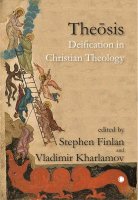Theosis: Deification in Christian Theology is the first of two edited volumes with several contributing authors. The main goal of this book, as presented by several authors, was to present the concept of “theosis,” or deification in Christian theology in a comprehensive but succinct manner. The term itself “refers to the transformation into the likeness of God” (p. 1). As the first volume of the series, this book tried to represent the overarching theme of the above doctrine in a way that covers a vast period of history in less than two hundred pages. The latter, in my opinion, had both positive and negative results. The positives of having a short and fairly written volume are that you get into the specific topic, in this case theosis, without having to spend vast amounts of time reading. The downsides, however, are that sometimes throughout the volume the reader feels that what he is getting is not too comprehensive, and that the information is too little to be relevant or understood properly.
I appreciated the effort of the editors to structure the book’s layout in a way that shows the concept of deification progressively throughout history. Starting roughly with the time of the New Testament Church, the book progressed gradually to the period of the Apostolic Fathers, the second-century apologists, and the later Nicene and Post-Nicene Fathers. The historical rehearsal continued through some of the Reformers, and finally to two modern theologians. I particularly liked how the overall development of the doctrine was presented, namely the shift from the early Fathers to the period of the 4th century onward when the theological framework of theosis became more established and defined. The authors helpfully record how the Apostolic Fathers viewed deification in mere “economical” terms rather than “ontologically,” which was how Athanasius, as well as the Fathers after him, thought of this doctrine. The interest of the former was more practical, meaning they were interested in the question of how one can achieve the state of theosis rather than what happens to human nature in this process (p. 53). The correlation of deification language with that of Greek philosophy was quite interesting. I found it helpful how the authors tried to show the distinction the biblical authors, such as in 2 Peter, as well as most later Fathers made when adapting certain words for constructing their theologies. The point is how the latter did not wholeheartedly accept the philosophical baggage that came with these words. However, as shown by Stephen Finlan in his chapter on 2 Peter, it did not mean that the author of the latter did not use verbatim words found in Plutarch when speaking about “participating in the divine nature” (p. 31).
Unfortunately, a certain bias was shown throughout the book, even though the authors no doubt tried their best to stay neutral. The bias was seen in some of the comments shown by some authors. One in particular was Jeffrey Finch. In his chapter on Irenaeus, he says, “It is evident, therefore, that the writings of Irenaeus cannot be marshaled to support the neo-Palamite position that the fathers of the Church grounded the possibility of sanctifying participation in God upon a real distinction between an intrinsically incommunicable divine essence and God’s communicable energies” (p. 103). First, this quote suggests at least a background knowledge is needed, something without which some unfamiliar readers will be confused. Second, without giving an exact explanation, the author is promoting a view of the divine simplicity of God supported by Catholic and generally Protestant theology. The concept itself means that God is identical to his attributes, and that in the beatific vision one will see God’s essence. The Eastern Orthodox view is different in that it makes a distinction between God’s essence and God’s energies: one cannot see God’s essence because His essence is essentially unknowable, but can know about God through his energies. This is a rough and by no means definitive explanation of the differences between the two viewpoints. The problem with the above author is not only that he sides with a particular group, but that at the same time does not give a succinct presentation of the two opposing views. Also, it would have been helpful if he did not give his thoughts on the matter, but instead let the reader decide which view gives the most reasonable explanation.
Another matter of concern is found in the chapter entitled “Reformed Theosis.” The author, Myk Habets, tried to show how theosis is compatible with Reformed theology. Luther, Calvin, and Edwards respectively, did have some sort of concept of theosis compatible with their theology. As a matter of fact, it was surprising to see how the language of deification was well accepted among the latter and in no way alien to the others. My concern, however, was that the author did not try to explain the very keen differences between how the Church Fathers viewed theosis and how the Reformers viewed it. The feeling that I was left with was that both camps are essentially in agreement, and nothing could be further from the truth.
Finally, the last chapter, “The Comedy of Divinization by Soloviev,” seemed out of balance and did not fit the structure and aim of the book. The language was too abstract and philosophical and, in my opinion, did not connect well with the theological discourse advocated by the previous authors. The likely is a consequence of having an edited volume with different authors who have different perspectives. All in all, my opinion is that Theosis: Deification in Christian Theology is fairly written. Nonetheless, there were several areas where the book could have been better by being more explanatory and less biased. Overall, however, I think this book is a good introduction to theosis for those who have at least some background in the East and West theological discourse, especially in the areas where they differ.
